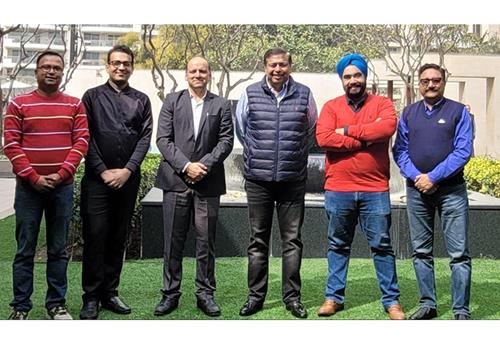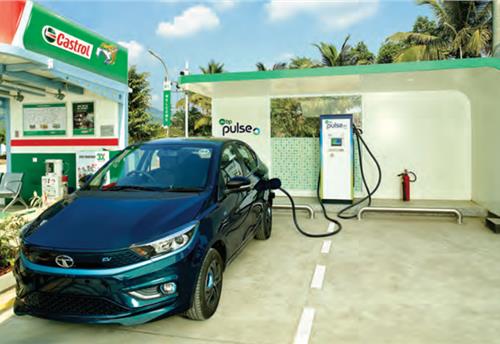Sun Mobility aims to be a game-changer in the e-mobility era
The company is set to start battery manufacturing and is looking to start a pilot project of battery stations from 2019.
The Bangalore-based start-up, co-founded by technocrat Chetan Maini, is set to start battery manufacturing this month and is looking to start a pilot project of battery stations from 2019.
I don’t think I will be doing this today if I hadn’t had those 20 years of experience. What we have been able to achieve in 12-14 months would have taken us, maybe, 3-4 years," says Chetan Maini, co-founder and vice-chairman of Sun Mobility, and founder and former promoter, Reva Electric Car Company (now Mahindra Electric Mobility). Maini is talking about the learnings he has carried over from being an electric carmaker selling cars in India and Europe to now being an energy solution provider to potentially every OEM in the electric mobility space.
When he was a manufacturer of electric cars, Maini struggled to get enough customers for his cars. The hurdles from the customer perspective were – very high acquisition cost, long recharging time and range anxiety. The solution that Maini and his team are preparing now tries to addresses exactly those problems. "Our solutions for the first time can address issues of range anxiety, of long refuelling time and total cost of ownership. I think if we could do that, we can bring the fundamental shift. And it is very important that the solution is an open architecture because then it could be truly deployed across any platform," says Maini.
The analyses based on data from cars that clocked millions of kilometres in conditions ranging from -20deg Celsius in Norway to almost 50deg C in Rajasthan are helping Maini and team to design their solutions.
The first batch of battery swapping stations will be set up during the October-December quarter of this year. Delhi-NCR, Bangalore and a city or two in Andhra Pradesh could be the first set of markets. Commercial launch for the same will start from early 2019. Sun Mobility is planning to take both company-owned-company-operated and franchisee models for its business. The pilot plant at Bangalore for battery manufacturing has already started operations. The cells are imported while the rest – packaging, thermal management, onboard computer systems to battery managements, integration and testing – are all done in-house. Initially, the plant will have an annual production capacity of 30,000 batteries.
One of the concerns pertaining to the battery swapping model has been the mechanism to ensure consistency in the quality of the battery that goes into the vehicle each time. Three onboard computers are built into every battery so that Sun Mobility can monitor its quality in real time. "This allows us to continuously optimise the battery. When it goes to a station, we have a set of diagnostics and we make sure that it is always within the level. So consumers use 50 percent, they pay for 50 and at all times they get batteries that have the highest performance. If a battery ever drops below our performance guarantee, it is removed from the ecosystem," clarifies Maini.
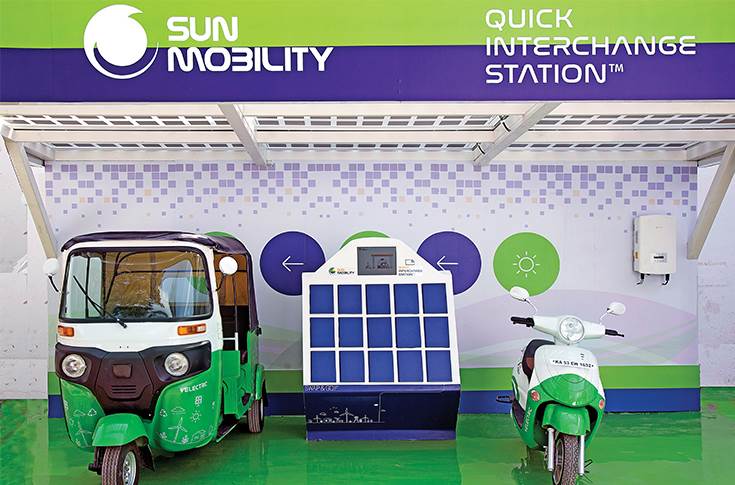
A quick interchange station for EV battery swapping
Among the many debates against electric mobility is the one on the unfavourable well-to-wheel quality of energy consumption. Sun Mobility has designed its stations to be directly plugged into the network and provide renewable power. "For the bus stations, we can also buy open access power, which means we can tie up with renewable energy providers; that would be our target because the bus stations take over a megawatt and in most service states in the country you have a megawatt open access," says Maini.
Making the first moves
Initially, Sun Mobility will target buses, autorickshaws and shared mobility service providers to sell its services. "It is easier for us to give solutions for them; with time we move into personal mobility. We believe as more OEMs deliver products in this line, consumers can have an option where they could use a fixed battery but then have to spend more money upfront or prefer a subscription model, where you pay as you go," says Maini. He is bullish on the adoption prospects of Sun Mobility's services and it is based on the mass-scale adoption of digital services and the gradual growth of the subscription model in sectors like telecom and mobility.
In the first year of its operations, from April 2016, the exclusive focus for Sun Mobility was on developing the core technologies and solutions. This year, the focus is on integrating them in the field and also finishing the pilot projects, before their commercial launch next year. After Ashok Leyland, Sun Mobility is learnt to have struck alliances with two and three-wheeler OEMs. Maini won't comment on it as he is bound by non-disclosure agreements. What he would say is that Sun Mobility has "garnered enough interests" which includes "significant interest from large companies too".
With these developments, Maini is bullish about the start-up turning profitable by 2021.
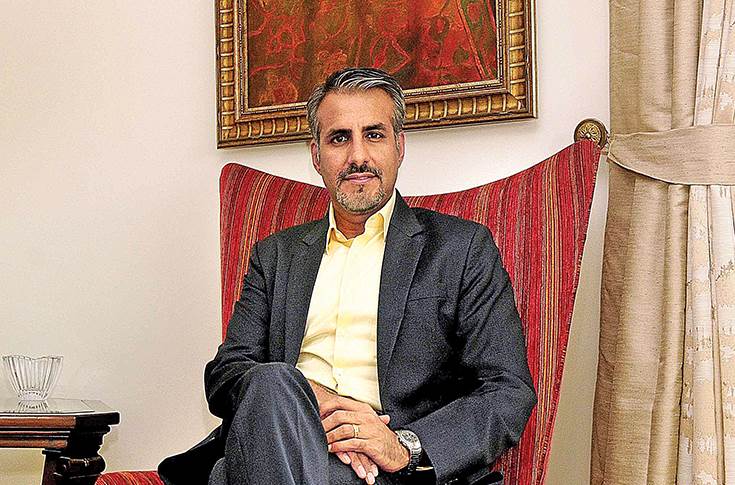
Q&A with Chetan Maini
After the alliance with Ashok Leyland, how far have things progressed? Has Sun Mobility got more OEMs on board and what are the new areas that you are looking at?
With Ashok Leyland, we showcased the technology in February and since then several buses are running around for testing and validation which is going very well and so the program is successfully moving forward. It is in the validation phase.
We just launched our open architecture solution for two-wheelers and three-wheelers. The idea was to create one solution for 20 million vehicles produced in the country. In this area, we have already teamed up with multiple OEMs. We have technology agreements with many of them, due to which we are integrating our technology with these vehicles. Several of these vehicles have been tested right now by us as well as our partners.
What is the business model going to be once you have a critical scale in terms of partners. Would it be like the network of fuel bunks that we see today?
I think that broadly, the ownership of the batteries resides with us and we also own the stations. We have models where we own everything, there's going to be a model where we franchise it at individual level and then with master franchisees for certain regions. We are exploring all options and today we have interest from large energy players to large network of operators across platforms.
The nice thing is that it does not have to be in a standard petrol bunk. There could be many other applications. It can be installed in one day. You can enhance the capacity in a day, so the flexibility allows us to have multiple options that would be directly owned or through a franchisee.
Do you see yourself entering the vehicle space again, maybe in a very different manner?
We work with OEMs very closely. We have a vehicle integration team which is essential. We see ourselves as partners.
We are more of the energy business enablers, we also help the shared economy, in a way because our vehicles are always connected, so all of a sudden our vehicles could get to share economy business very easily.
Thus, we are empowering the mobility sector and we are empowering the OEMs. We are bringing a solution that truly allows us to accelerate into shared mobility, which is essential for our country with all the traffic challenges that we have. Therefore, we would have to move into the shared economy.
(This article was first featured in the 1 August 2018 issue of Autocar Professional)
RELATED ARTICLES
Branded content: HL Klemove inaugurates first Local ADAS Radar Manufacturing Unit in India, marks a significant achievement in “Make in India” initiative
The inauguration ceremony was held in the presence of Vinod Sahay, President and CPO of Mahindra & Mahindra Ltd. and Dr....
BluWheelz to 'Green Up' logistics sector
With their EVs-as-a-service solution, the startup is playing it smart with costs and looking to electrify the entire seg...
BRANDED CONTENT: Spearheading the EV revolution in India
Jio-bp is a joint venture between Reliance Industries and BP PLC where both entities have married international expertis...





 24 Oct 2018
24 Oct 2018
 11674 Views
11674 Views



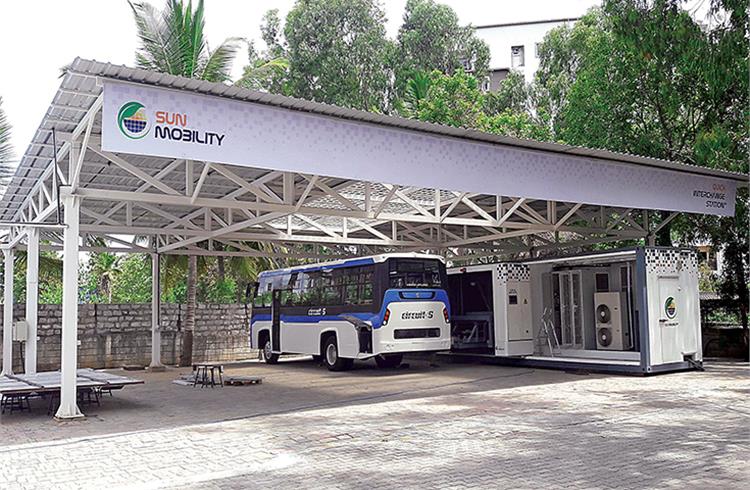
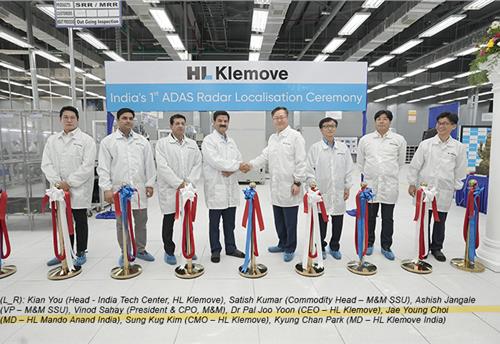
 Autocar Pro News Desk
Autocar Pro News Desk

